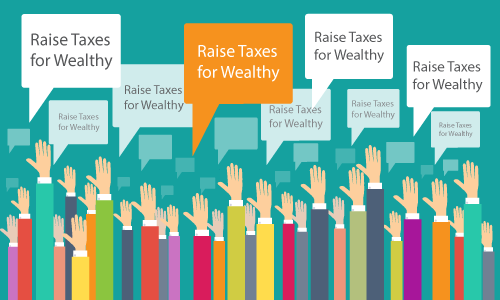Voters in Multiple States Choose Higher Taxes for the Wealthy

Of course, the big news from the election earlier this month was that Donald Trump shocked the world and defeated Hillary Clinton in the race to become the 45th president of the United States. However, there were several other important national, as well as local, election races and issues that were decided on November 8th. Not the least of which were several state measures aimed at raising taxes on high net worth individuals.
To that end, voters in both California and Maine decided that the rich needed to pay more taxes. In Maine, the vote to raise the state’s top tax rate from 7.15 percent to 10.15 percent was extremely close, passing by a narrow 50.4 percent to 49.6 percent margin. That means Maine will have the second highest top tax rate in the country in 2017, surpassing Oregon, which was number two in 2016 at 9.9 percent.
In California, meanwhile, the vote wasn’t even close, with 62 percent voting to extend temporary tax hikes already in place. Proposition 55 extended the hikes originally implemented in 2012 with Proposition 30. That means top earners, those who make $1 million or more a year, will continue to pay a tax rate of 13.3 percent at least until 2030. California will continue to have the highest tax rate for top earners in 2017.
So, while all signs point to Donald Trump lowering the federal tax rates, if you live in California or Maine and you’re a top earner, you won’t see any relief in the coming years in your state taxes.
http://www.forbes.com/sites/ashleaebeling/2016/11/10/voters-okay-state-income-tax-hikes-for-the-rich/#71480a7b16d0
Save for Retirement – Early is Better than Late
Save for Retirement – Early is Better than Late We all should plan for our retirement. The worst thing that can happen is to reach an age where you don’t want to work anymore, and not be able to quit because you don’t have the money saved to do so. Most of us start saving…
Estate Tax Confusion Continues as of 2/13/10
Estate Tax Confusion Continues as of 2/13/10 As of 2/13/10, U.S. estate tax outcomes — (and capital gains tax for the heirs) — for taxpayers who pass away in 2010, are becoming more confusing each day Congress does not act to replace expired laws. The following is a Wall Street Journal article on the complete…
Estate Tax Repeal or Revision?
Estate Tax Repeal or Revision? In 2010 the estate tax will be repealed and the gift tax rate will fall to 35%. However, this repeal is effective only for that year and the estate tax will be reinstated in some form the very next year (2011). The US Senate is considering options to reduce or…
Alternative Retirement Savings Plan: Tax Sheltered Annuity 403(b)
Alternative Retirement Savings Plan: Tax Sheltered Annuity 403(b) Tax-Sheltered Annuity (TSA), also known as a 403(b), is an alternative retirement savings plan. Not everyone can participate in this plan, and it is restricted to those who are employed by educational, cultural, or non-profit organizations such as religious groups (also known as 501 (c)(3) organizations). TAX-SHELTERED…

